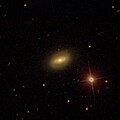NGC 3 (original) (raw)
From Wikipedia, the free encyclopedia
Galaxy in the constellation Pisces
| NGC 3 | |
|---|---|
 NGC 3 by the DESI Legacy Surveys NGC 3 by the DESI Legacy Surveys |
|
| Observation data (J2000 epoch) | |
| Constellation | Pisces |
| Right ascension | 00h 07m 16.8s[1] |
| Declination | +08° 18′ 06″[1] |
| Heliocentric radial velocity | 3900 ± 50 km/s[1] |
| Distance | 172 million light-years (53.9 mpc) [1] |
| Apparent magnitude (V) | 14.2[1] |
| Characteristics | |
| Type | S0[1] |
| Apparent size (V) | 1.1' × 0.6'[1] |
| Other designations | |
| UGC 58, PGC 565, GC 5080, Ark 1.[1] |
NGC 3 is a lenticular galaxy with the morphological type of S0, located in the constellation of Pisces. Other sources classify NGC 3 as a barred spiral galaxy as a type of SBa. It was discovered on November 29, 1864, by Albert Marth.[2]
Observational History
[edit]
NGC 3 was discovered by Albert Marth on 29 November 1864 and was described as "faint, very small, round, almost stellar".[2]
NGC 3 is a lenticular galaxy, while other sources tagged NGC 3 as a barred spiral galaxy. NGC 3 is located at a distance of about 172 million light-years from Earth. NGC 3 has a magnitude of 14.2.[1]
NGC 3 appears to have a faint spiral arm structure, along with a weak bar.
Listing in Astronomical Catalogues
[edit]
NGC 3 is first cataloged as GC 5080, an addendum to Dreyer's 1877 Supplement to the General Catalogue of Nebulae And Clusters of Stars. The object is cataloged as UGC 58, PGC 565, Ark 1, MCG+01-01-037, and CGCG 408–35.
- ^ a b c d e f g h i "NASA/IPAC Extragalactic Database". Results for NGC 0003. Retrieved 2006-11-04.
- ^ a b Seligman, Courtney. "NGC 3". Celestial Atlas. Archived from the original on 6 November 2018. Retrieved 6 November 2018.
 Media related to NGC 3 at Wikimedia Commons
Media related to NGC 3 at Wikimedia Commons- NGC 3 on WikiSky: DSS2, SDSS, GALEX, IRAS, Hydrogen α, X-Ray, Astrophoto, Sky Map, Articles and images

